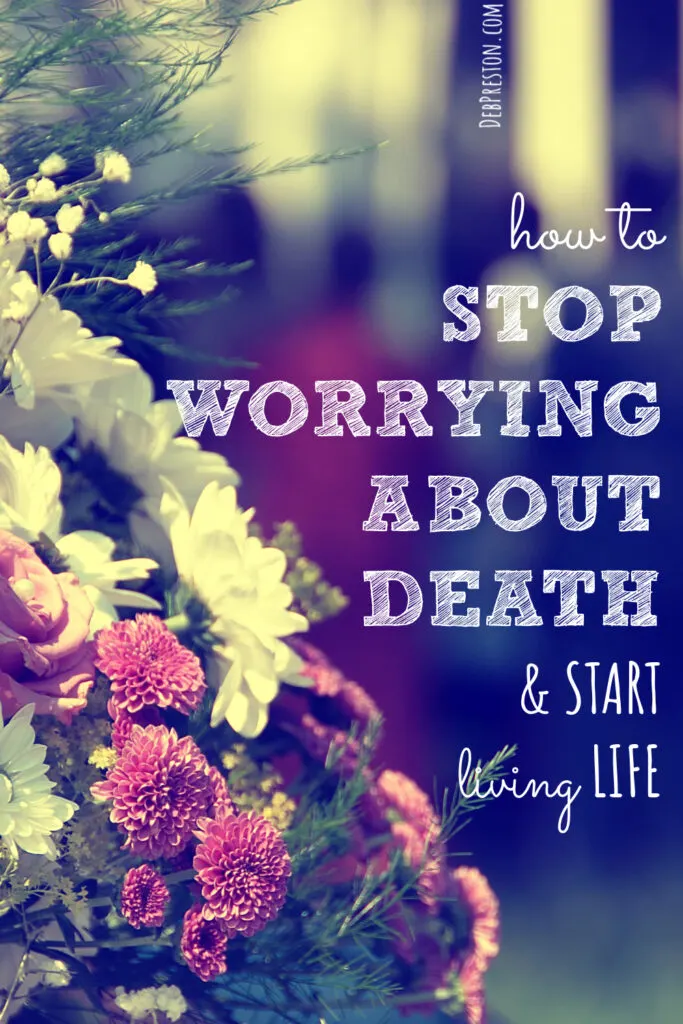When my daughter was first born, I became immediately and deeply worried about dying.
What would happen to my baby if I died? What would happen to my family? How would my husband respond in the face of such a huge and life-altering loss?
It became an almost obsessive daily prayer – “Lord, please protect me today from car accidents, shootings, a terminal diagnosis, or anything else that could shorten my life.”
When you’re worried about dying, it can consume your thoughts and emotions. It can steal your joy from daily living and keep you up at night.
I had to research how to stop worrying about death for my own sanity’s sake. Here’s what I learned and what worked for me, and how you can stop worrying about death too!

Understanding Death Anxiety
Everyone, at some point, contemplates their own mortality. Recognizing the signs of death anxiety, or thanatophobia, can help you navigate these thoughts.
Distinguishing Between Normal Concern and Excessive Worry
It’s natural to think about your own mortality, but it’s the type of worry that differentiates a healthy awareness from debilitating fear. Here’s how you can tell the difference:
- Normal Concern: You think about death occasionally, often spurred by specific events, like a loved one passing away or a health scare. You accept it as a part of life, and it doesn’t disrupt your behavior.
- Excessive Worry: Death is a recurring preoccupation affecting your ability to live freely. This might look like avoiding activities due to fears of death, experiencing anxiety or panic attacks that seem disproportionate to the situation, or even having it interfere with your overall quality of life.
Understanding your thoughts and reactions related to death and assessing whether they align more with normal concern or excessive worry can guide you toward seeking help or finding strategies to cope with your fears.
Recognizing Symptoms of Thanatophobia
Thanatophobia, on the other hand, is an intense fear of death that can manifest in a wide variety of ways in your life.
You might experience physical symptoms such as a racing heart, difficulty breathing, or even full-blown panic attacks. Emotionally, you may be gripped by feelings of dread or persistent thoughts about your own death that intrude upon your daily life.
You may be dealing with thanatophobia if you experience:
- Frequent, intrusive thoughts about death
- Physical symptoms (e.g., chest pain, dizziness, panic attacks)
- Avoidance behavior (e.g., shunning medical tests)
- Disrupted sleep patterns due to worry about death.
Cultural and Personal Beliefs Impact
Those who experience excessive worry about death are almost never the only factor at play in establishing those fears.
Your cultural and personal beliefs can make a significant difference in affecting your views on your own death, as well as death in general. Understanding how these beliefs shape the ways you perceive and cope with the concept of dying can help you better manage your fears surrounding the end of life.
Influence of Religious and Spiritual Views
Religious beliefs provide frameworks that help many people come to terms with the notion of their own death.
For instance, my Christian faith assures me that death is actually a transition to an afterlife in heaven, where I’ll be reunited with my loved ones. This knowledge alone offers the best way for me to significantly alleviate my fear of dying.
If you follow a different faith, engaging with your religion’s teachings about the dying process can offer solace and a sense of peace. It might be valuable to explore practices and rituals that your religion prescribes for dealing with death, as these can serve as tools for coping.
- Christianity: Focuses on the belief in eternal life and resurrection.
- Hinduism: Teaches about the soul’s journey and reincarnation.
- Buddhism: Emphasizes impermanence and sees death as a natural part of the life cycle.
- Islam: Stresses life after death and accountability for actions in this world.
Understanding your religious beliefs can shape how you perceive the finality of death and influence your emotional response to it.
Personalizing Your Understanding of Death
Your personal views are just as significant as cultural ones in shaping your mindset towards death.
Reflecting on your own experiences, values, and beliefs can help you form a personal understanding of death. Acknowledging that death is a part of life and considering what it means to you can help normalize the idea and reduce anxiety.
- Assess your thoughts: Pinpoint what specifically about death causes you concern.
- Talk about it: Discussions with loved ones can provide new perspectives and comfort.
- Write it down: Journaling your feelings may clarify your thoughts and fears.
By engaging with your personal beliefs about the dying process, you can cultivate a more peaceful approach to the inevitable, turning what may once have felt like a fear into a respectful acknowledgement of life’s cycle.

Coping Strategies for Managing Fear
While it may seem counterintuitive, addressing your death anxiety is the best way to dramatically improve your quality of life by reducing anxiety and helping you to appreciate the present. Here’s how you can build a healthier outlook and better manage these fears.
Developing a Healthy Perspective on Death
Cultivate acceptance: Determine to embrace the fact that death, even your own death, is a natural part of life. Rather than viewing it with fear, recognizing its role can help you to embrace life more fully.
Strategies like creating a memento mori practice can serve as gentle reminders to live purposefully.
Clarify your values: Speaking of living purposefully, reflect on what truly matters to you, which can shift focus from fear to living a life aligned with your priorities. By understanding your values and purpose, you can shift your focus to investing your time and energy into what brings joy and fulfillment.
Practicing Mindfulness and Focusing on the Present Moment
Mindfulness exercises: Incorporate simple practices such as deep breathing or meditation into your daily routine. These techniques can quiet intrusive thoughts about mortality and bring you peace, helping you focus on the present moment.
Enjoy the now: Cultivate an awareness of the present by engaging fully with your daily activities.
Whether you’re eating, walking, or conversing, immerse yourself fully to savor these moments. This can make your daily life more meaningful and reduce anxiety.
Utilizing Cognitive Behavioral Therapy
Challenge negative beliefs: Cognitive behavioral therapy, or CBT, helps identify and question your fears and the thoughts that fuel them. By examining the evidence for and against your death anxiety, you can develop a more balanced perspective.
Develop coping skills: Through cognitive behavioral therapy, you can learn specific techniques to manage anxiety in a healthy way. This includes relaxation strategies and problem-solving skills that help you deal with stress proactively.

Addressing Intrusive Thoughts and Phobias
Dealing with intrusive thoughts about death and overcoming specific phobias can significantly reduce anxiety and improve your mental well-being.
Confronting and Challenging Intrusive Thoughts
Intrusive thoughts are unwelcome and often distressing thoughts or images that can create significant anxiety. The key to managing them lies in directly acknowledging their presence without giving them undue attention or power.
Start by labeling these thoughts as “intrusive” and reminding yourself that they do not define your desires or reality. Practice the approach recommended by Harvard Health, where you identify these thoughts simply as mental noise rather than directives.
Mindfulness techniques, such as observing the thoughts without judgment, can help reduce their impact over time.
Exposure Therapy to Reduce Specific Phobias
Exposure therapy is a well-established method in treating specific phobias, a type of anxiety disorder characterized by an irrational fear of an object or situation. By gradually and repeatedly confronting the feared object or scenario in a controlled and safe environment, you can lessen the power it holds over you.
This process is known as systematic desensitization. Mayo Clinic Press indicates that with time and patience, exposure therapy helps reduce anxiety responses and can be a freeing experience for those struggling with phobias.
Support Systems and Communities
Building meaningful connections and environments for support can be pivotal in managing concerns about mortality. Not only can you find solace in sharing your feelings, but it’s the best way to gain new perspectives from different support systems and communities.
Talking with a Family Member or Best Friend
Openly discussing your worries with a family member or a best friend can help you feel less isolated in your thoughts on death. These conversations can provide comfort and a deeper bond when those who care about you offer their understanding and support.
Finding and Joining Support Groups
Joining a support group can be an excellent way to connect with others who are dealing with similar concerns.
Whether online or in person, these groups offer a safe space to express your feelings and share coping strategies. This can help you realize you’re not alone on this journey.
Exploring Death Cafes and Discussion Groups
If you’re seeking a more casual and open-ended conversation about death and dying, consider visiting a death cafe. These are not grief support or counseling sessions, but rather places where discussions about death are encouraged, with no agenda, objectives, or themes.
Professional and Medical Support
Addressing the anxiety surrounding death often requires more than self-help strategies, and there’s no shame in reaching out for professional and medical support. When your worries begin to interfere with your daily life, it may be time to seek help from a licensed therapist or mental health professional.
When to Seek Professional Help
If you find that your concern about death is overwhelming and affecting your ability to enjoy life, it’s likely time for you to seek professional help. An incessant preoccupation with death or persistent anxiety that disrupts your day-to-day activities are signs that you could benefit from a professional evaluation.
Different Therapy Options for Anxiety Disorders
Cognitive behavioral therapy sometimes offers the best way to address death anxiety and other mental health disorders.
Cognitive behavioral therapy (CBT) is often used to treat anxiety by helping you understand and change thought patterns. Exposure therapy, a branch of CBT, can gradually and safely expose you to the concept of death to minimize fear.
Moreover, group therapy provides a community of support, where you can openly discuss your fears with those who have similar experiences.
The Role of Medications in Treatment
While cognitive behavioral therapy addresses the cognitive and emotional aspects of anxiety, medications such as selective serotonin reuptake inhibitors (SSRIs) can help manage the physiological symptoms. SSRIs are commonly prescribed to regulate mood and are often effective for anxiety disorders.
Discussing with your healthcare provider can determine whether medication is a suitable course of action for your individual needs. Remember that medication should be considered a part of a comprehensive treatment plan and is most effective when combined with therapy.

Living with Acceptance and Without Fear
Embracing the fact that life is finite can serve as a powerful catalyst for living a more fulfilled, present everyday life.
Many people experience fear of dying. But how you manage this fear can transform the way you live and experience your daily life.
Learning how to stop worrying about death was about so much more than coping for me; it introduced a turning point in my life where I refused to waste another minute zoned out in front of TV or social media. It started me on a path of living every day with purpose and passionately pursuing my dreams.
Develop Acceptance
Accept that death is a part of life. This long-term perspective can reduce the intensity of your anxiety, giving you space to enjoy the here and now.
Reflect on what you can control and let go of worrying about worst-case scenarios. These are often out of your grasp.
Healthy Routines
Incorporate habits into your daily routine to help anchor your mindset in the present.
- Exercise: Keeps you physically healthy and helps manage anxious thoughts.
- Mindfulness: Practice being in the moment through meditation or deep-breathing exercises.
Perspective Shift
Use the inevitability of death as a motivational tool.
- Prioritize Relationships: Strengthen your connections with others.
- Live Authentically: Align your actions with your values and passions.
- Embrace Change: See new experiences as opportunities, not threats.
By making small, intentional changes in your approach to life, you can diminish the hold that the fear of death has over you.

Remember, it’s about progress, not perfection. Take each day as a chance to live a little more boldly, a little more kindly, and a lot more fully in the present moment.
Friend? You’ve got this!

P.S. Ready to escape survival mode? Start living life on YOUR terms! The Take Charge Collection of 15 free resources will help you to simplify, organize, and take charge of your life! Gets yours HERE.
Disclosure: While all opinions are our own, we are a participant in the Amazon Services LLC Associates Program and other affiliate advertising programs, designed to provide a means for us to earn fees by linking to Amazon.com and affiliated sites, at no additional cost to you.



